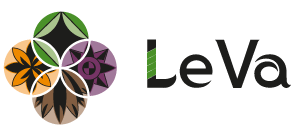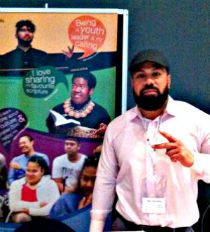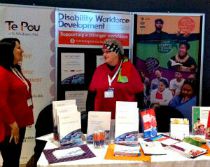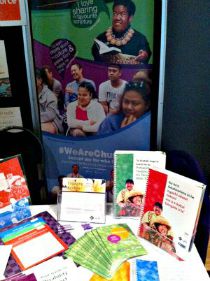- Home
- /
- Disability
- /
- ‘Person-centred’ at the NZDSN Conference 2015

‘Person-centred’ at the NZDSN Conference 2015
Le Va was privileged to partner with Te Pou recently at the annual two-day New Zealand Disability Support Network conference at Te Papa Museum in Wellington where we presented our disability work, which included promoting resources and tools for the workforce and people using services.
With a conference theme of Partnerships for Outcomes: New models in Action, examples of successful and proposed partnership models were showcased, putting disabled people in the driver’s seat.
Papers and presentations were organised around the following five work streams:
1. Person-directed planning and decision making
2. Partnership initiatives in service provision
3. Workforce development and the voice of disabled people
4. Monitoring, evaluation, governance and leadership
5. Organisational capacity, leadership and management
There were clear messages throughout the two days around having a person-centred approach with individuals who access disability support services and also within the workforce and organisations.
This was a particular focus of keynote speaker Gillian Bailey who shared what she believed to be the three key personalised approaches to planning and support that will place the person receiving support in the driver’s seat: one page profiles, person-centred reviews and working together for change.
Our Organisational Guidelines for Disability Support Services: Working with Pasifika People with Disabilities and their Families are focussed on a person-centred approach as best practice.
The nine guidelines are shaped by principles, with one being on ‘quality health and disability support services’, where the key dimensions of quality are access, equity, cultural competence, safety, effectiveness, efficiency and person-centredness. These are also based on the Minsitry of Health’s Ala Mo’ui: Pathways to Pacific Health and Wellbeing 2014-2018.
The second of the nine guidelines is to ‘focus on a person-centred family approach’ in order to build a relationship of trust and work effectively with Pasifika disabled people and their families. The guideline gives a case study example and highlights organisational cultural competency:
| “Organisational processes for engagement with the Pacific community should incorporate a commitment to being people-centred, family-oriented and reciprocal. The role of family must be acknowledged in policy and process as playing a fundamental role in ensuring the services delivered to the Pacific client are appropriate and effective. Clients should always be provided with an opportunity to have family members present. The role of cultural advisors or cultural brokers employed by the organisation should extend to providing support and channelling feedback from the client and family back to the organisation to ensure services are meeting their needs. By employing a ‘person-centred’ approach, organisations will also be able to tailor the delivery of information and services according to the diverse needs within the Pacific community, especially with respect to youth and New Zealand-born Pacific peoples. This guideline supports the principle of ‘nothing about us without us’, which is fundamental to building a relationship of trust with all disabled people.” P. 19. |
Check out all the guidelines and read for yourself how to enhance your organisation’s cultural competency to work more effectively with Pasifika people and their families.
Scenes from the conference.
|
Ben at the stand. |
Working alongside our Te Pou colleagues. |
The resources and tools we were promoting to people who use services, their families and the workforce. |









